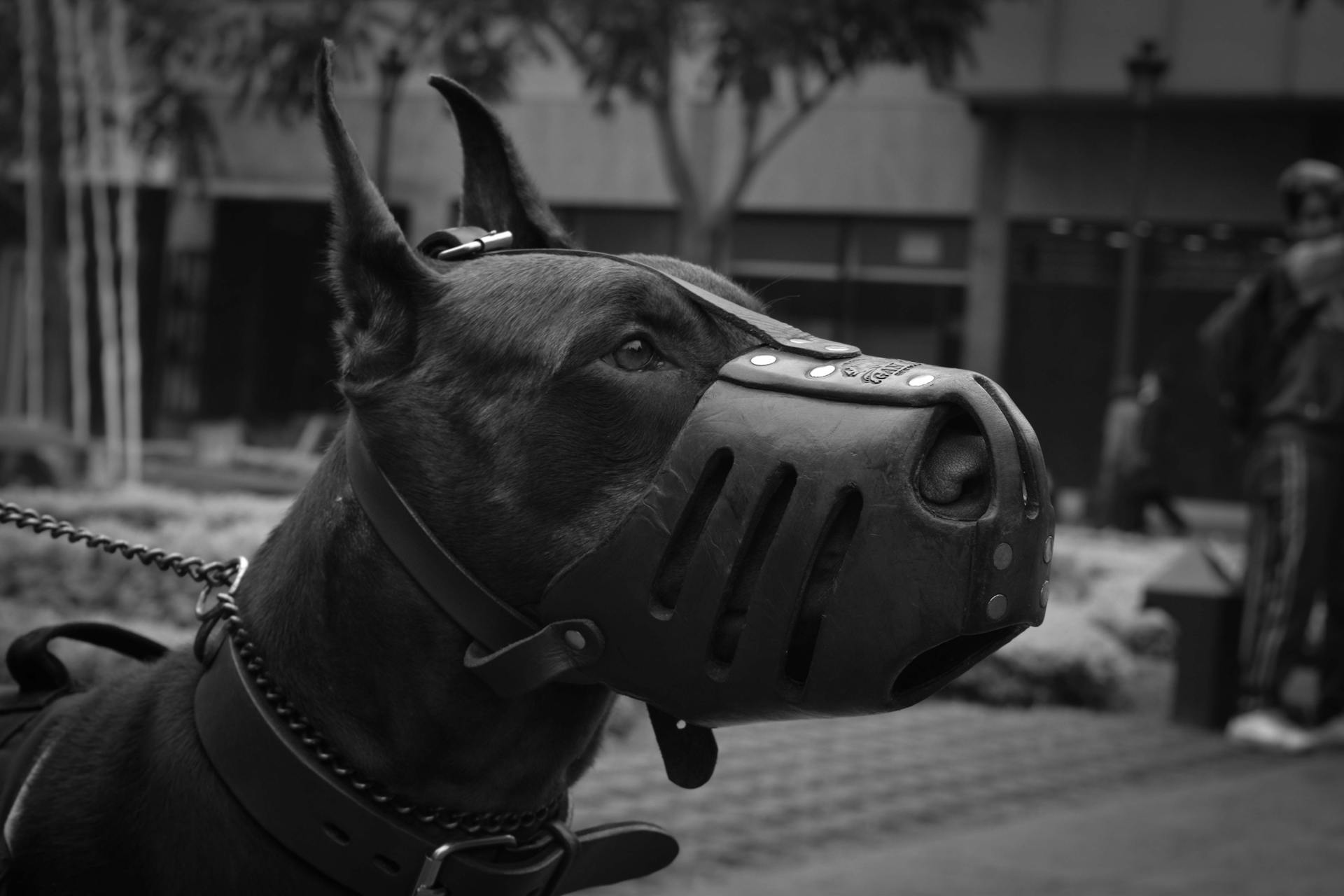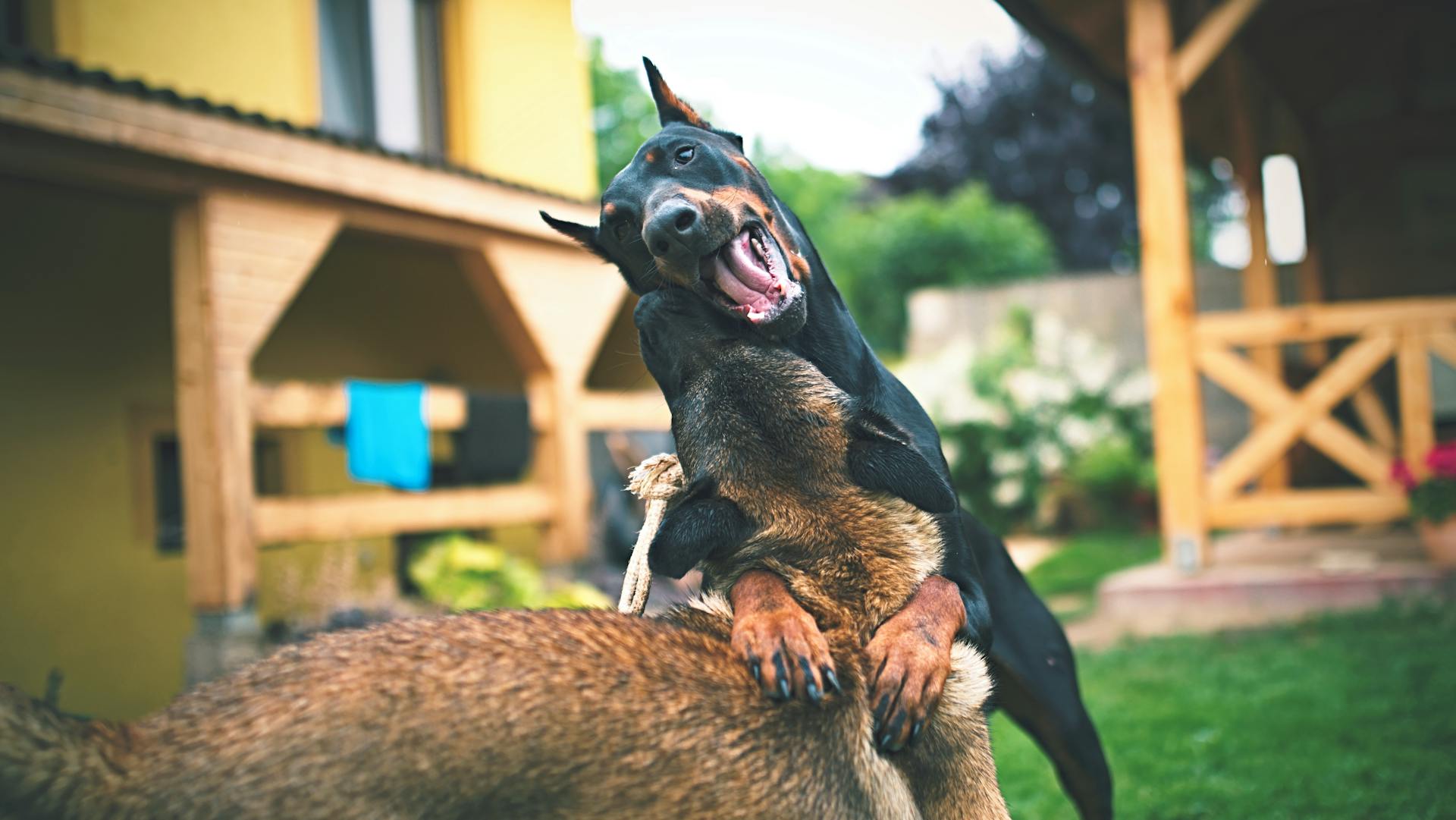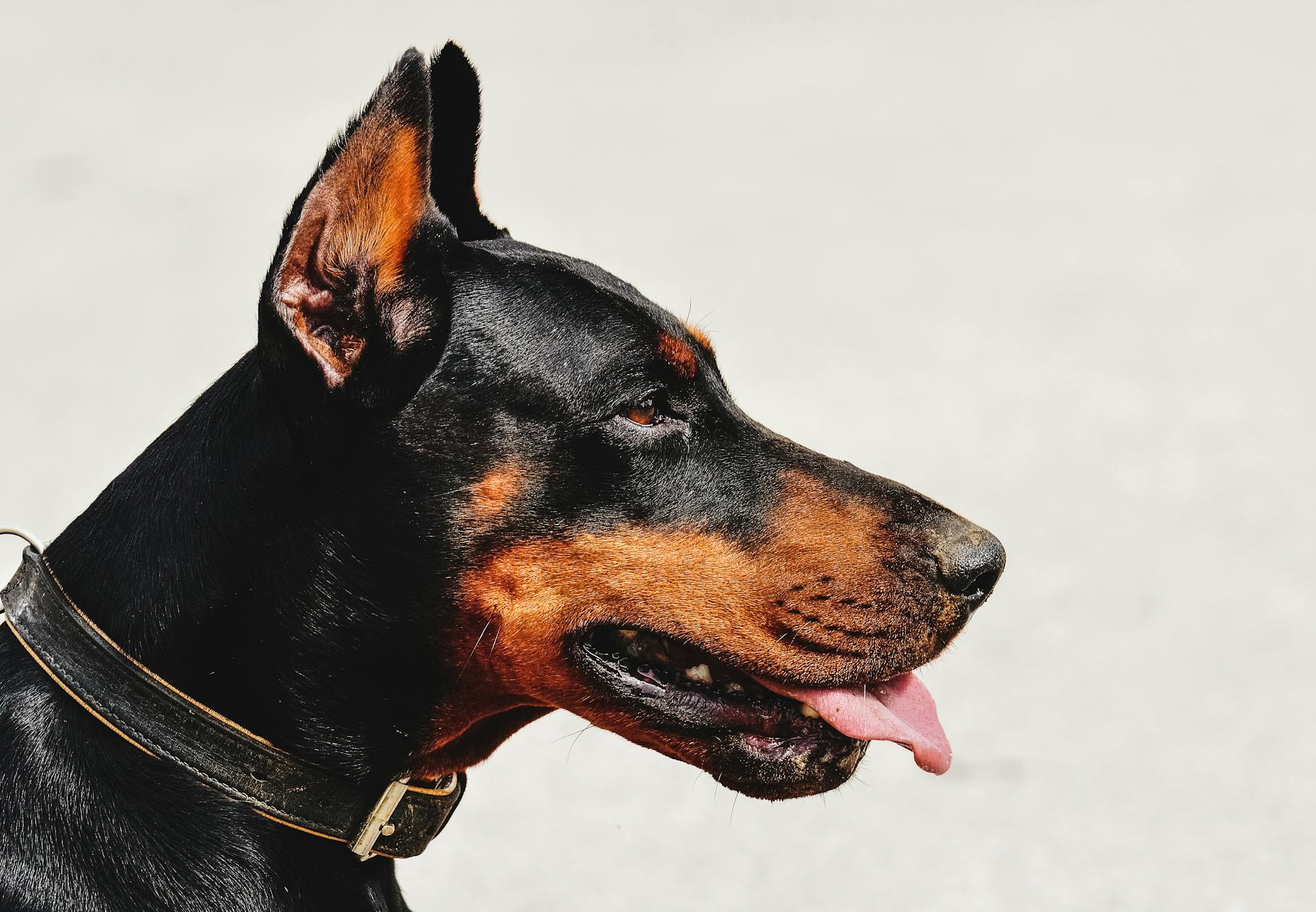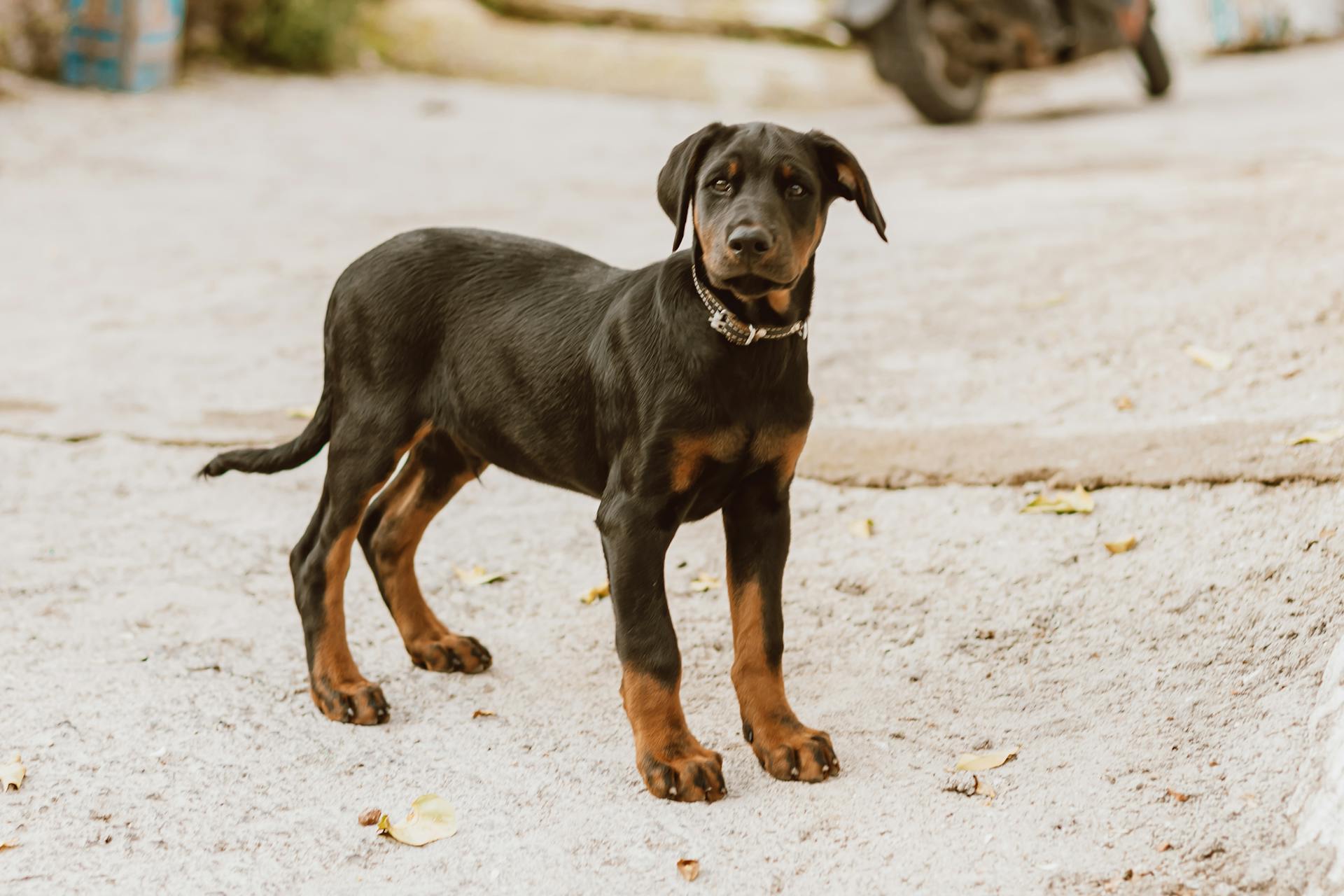
Raising a happy and healthy Doberman Pinscher requires attention to its exercise needs. Doberman Pinschers need at least 30 minutes of exercise per day to stay happy and healthy.
To keep your Doberman Pinscher's mind and body active, you can take it on long walks or engage in high-intensity activities like agility training. With proper exercise, your Doberman Pinscher will be less likely to develop behavioral problems.
A happy Doberman Pinscher is also a well-fed one. Doberman Pinschers require a balanced diet that includes protein-rich foods like chicken and beef.
If this caught your attention, see: A Guide to Managing Healthy Weight in Your Dog This Summer
Care and Maintenance
Doberman Pinschers are known to be moderate to heavy shedders, so be prepared for regular grooming sessions.
Their short, smooth coats are relatively low maintenance, making them a great choice for busy owners.
You may be able to go six to eight weeks between baths, but this will change if your Doberman gets dirty outside.
Be careful not to cut the quick when trimming your Doberman's nails, as it's tough to see with their dark-colored nails.
Their paws are sensitive, so it's essential to trim their nails carefully to avoid any discomfort.
Explore further: Why Are My Dog's Nails Splitting?
Health and Wellness
As a Doberman Pinscher owner, you want to know that your furry friend is living a long and healthy life. The average lifespan of a Doberman is 10-12 years, but like all breeds, they can be prone to certain health issues.
Dobermans are susceptible to dilated cardiomyopathy (DCM), a heart condition that occurs when the heart muscles stretch and weaken, making it hard to pump blood to the rest of the body. This is a serious condition that requires prompt veterinary attention.
To keep your Doberman healthy, it's essential to be aware of the signs of bloat, a potentially life-threatening condition that occurs when gas builds up in the stomach. Early detection is critical in saving your dog's life.
Here are some common health issues that can affect Dobermans:
- DCM: a heart condition that occurs when the heart muscles stretch and weaken
- Canine acne: a skin condition that can cause pimples and inflammation
- Seizures: a neurological condition that can be caused by epilepsy
- Bloat: a condition that occurs when gas builds up in the stomach
- Canine von Willebrand Disease (vWD): a bleeding disorder that can cause excessive bleeding
- Hip dysplasia: a condition that occurs when the hip joints don't develop properly
Health Issues
Doberman Pinschers are generally a healthy breed, but like all dogs, they can develop certain health issues. The average lifespan of a Doberman is 10-12 years.

One common health concern is dilated cardiomyopathy (DCM), a heart condition that can occur when the heart muscles stretch and weaken. This can lead to a decrease in blood flow to the rest of the body.
Growing pains are another issue that can affect young Dobermans. These pains can cause limping and lameness due to inflammation in the leg.
Bloat is a serious condition that can be fatal if not treated promptly. It occurs when gas builds up in the stomach and can cause the stomach to twist, restricting blood flow.
Doberman Pinschers can also be prone to canine acne, also known as folliculitis and furunculosis. This is a skin condition that can cause pimples and other skin issues.
Seizures are another potential health issue for Doberman Pinschers, with epilepsy being a common cause. Early detection and treatment are crucial to managing this condition.
Here are some common health issues that can affect Doberman Pinschers:
- DCM (dilated cardiomyopathy)
- Canine acne (folliculitis and furunculosis)
- Seizures (epilepsy)
- Growing pains
- Bloat
- Canine von Willebrand Disease (vWD)
- Hip dysplasia
Healthy Lifestyle

To maintain a healthy lifestyle for your Doberman pinscher, regular exercise is essential. Aim for at least 30 minutes of physical activity per day.
Dr. Zazie Todd recommends helping your dog stay mentally stimulated through training sessions and playtime. This can include obedience training, agility training, or simply playing fetch.
A balanced diet is also crucial for your Doberman's overall health. Feed a high-quality dog food that meets their nutritional needs, and avoid overfeeding to prevent obesity.
Regular veterinary check-ups can help identify any potential health issues early on. Stay on top of vaccinations and schedule annual check-ups to ensure your dog stays healthy.
If this caught your attention, see: Dental Health Diets for Dogs
Training and Behavior
Doberman Pinschers are intelligent and thrive in obedience training. They need consistent training and socialization from an early age to redirect undesired behaviors.
Dobermans can become pushy and unmanageable without positive reinforcement training. They may also become reactive to novel stimuli, such as strangers or new objects.
Early socialization is key to developing a well-adjusted Doberman Pinscher. This means exposing them to various people, environments, and experiences from an early age.
Dobermans are usually patient with young children, but their excitable nature can lead to accidental knocks during play. Supervise interactions between kids and dogs at all times.
A strong prey drive in Dobermans can lead to chasing small animals, including cats. However, with proper introduction, Dobermans and cats can live together harmoniously.
Expand your knowledge: Do German Shepherds Get along with Cats
What to Feed
Feeding your Doberman Pinscher a complete and balanced diet is crucial for their overall health.
Commercial kibble or wet food approved by the AAFCO is a good way to ensure your Doberman receives a complete and balanced diet.
Dobermans need easily digestible protein for healthy muscles, including the heart.
Inclusion of omega-3 fatty acids (DHA/EPA) in the diet supports healthy skin, coat, kidneys, and heart.
A pre-portioned meal plan can supply a boost on all fronts, including providing enough energy for daily activities and maintaining a healthy weight.
A fresh viewpoint: Doberman Pinscher Heart Problems
Supporting joint health is key, especially in large breeds like Dobermans.
A fresh diet that provides balanced Omega-3 fatty acids can help ward off joint issues common in large breeds.
Feeding a correctly portioned amount of food to a young puppy three to four times per day until around 6 months, then switching to twice a day, is essential for healthy growth.
A diet of fresh, lightly cooked food has been shown to be more digestible than processed kibble, promoting a healthy gut and good digestion.
Related reading: What to Feed a Doberman Pinscher
Tips and Advice
If you're considering bringing a Mean Doberman Pinscher into your family, be prepared for a lot of exercise and mental stimulation. These dogs need at least 30 minutes of exercise per day to stay happy and healthy.
Mean Doberman Pinschers are naturally wary of strangers, so early socialization is crucial to help them feel more confident in new situations. This means introducing them to lots of different people, dogs, and environments from an early age.
Take a look at this: Shiba Inu Exercise Needs
Housebreaking can be a challenge with any dog, but Mean Doberman Pinschers are particularly intelligent and trainable, making them more likely to pick up on commands and routines.
To keep your Mean Doberman Pinscher happy and healthy, make sure to provide them with a variety of high-quality dog food and plenty of fresh water. A balanced diet is essential for their overall well-being.
Mean Doberman Pinschers are naturally protective of their families, but they can be wary of other dogs, especially if they're not socialized properly. This means being careful when introducing them to new dogs, especially if they're not familiar with each other.
With patience, consistency, and positive reinforcement, you can help your Mean Doberman Pinscher become a well-behaved and loving companion.
Discover more: Doberman Pinscher Not Cropped
Frequently Asked Questions
What are the cons of Doberman Pinscher?
Like many purebred dogs, Doberman Pinschers are prone to certain health issues, including cardiovascular problems and genetic disorders
Sources
Featured Images: pexels.com

